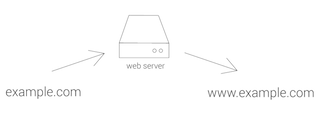
Glenn E. Fleming, MD, MPH, Contributor, MarketHive
(Reposted from Patrick Sexton, https://varvy.com)
There are four common types of redirects that affect how your users and Google see your mobile pages. Each of them is bad for performance (speed). They include:
* Initial redirect — canonical (www.example.com vs example.com)
- SSL — secure pages redirect
- Redirect to mobile version
- Content driven redirects
Initial Redirect (Canonical)

- Problem
Example: The url "www.example.com" and the url "example.com" are actually two different urls even though they typically will have the same content.
One has the "www" and one does not. Oftentimes webmasters will choose one or the other throughout their site (www or no www).To ensure that pages are always using the same version of the url, a site-wide redirect is typically used.
Thus, when typing "google.com" into a browser, the end-result is "www.google.com".
- Solution
This type of redirect was typically implemented for SEO purposes.The common logic was to obtain credit for each link given to a page because some people link to the "www" version and some link to the non-version of a page.
As a webmaster, one must decide if this value even still exists and if so, is it worth the redirect?
Google understands pages and sites much better now than it did when this redirect became a common practice and Google even offers you a way via Webmaster Tools to choose which version you prefer (without the redirect).
Take Home Points:
*Regardless, make sure your site-wide redirects are smartly working with other redirects like ssl.
*Do not redirect users to one version of page just to be redirected again to the secure (ssl) version.
*The way to actually review / update / remove it for most webmasters is to go to their htaccess file and find it:
RewriteCond %{HTTP_HOST} ^domain.com [NC]
RewriteRule ^(.*)$ http://www.domain.com/$1 [R=301,NC]
Alan Zibluk Markethive Founding Member
